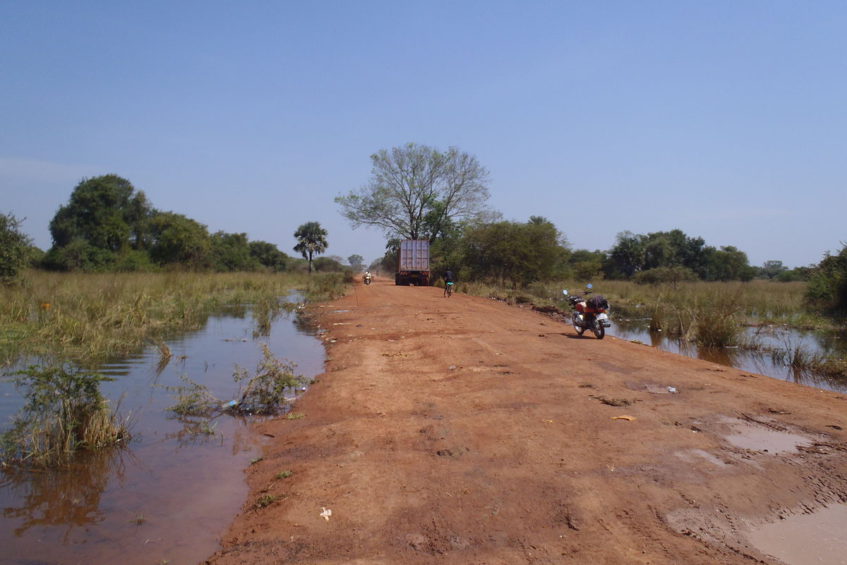
Murram road - Photo: (Courtesy).
At least forty-two people have been killed in just one week alone across South Sudan, Eye Radio has established.
Most of these deaths are related to communal fights, road ambushes, and banditries.
The killings happened in Lakes, Central, and Eastern and Western Equatoria states, and Ruweng Administrative Area.
Central Equatoria state is leading, with the highest number of civilian deaths in just one week.
Fifteen people were reported to have been killed.
On May 8, two civilians were shot dead in a crossfire as SSPDF and NAS forces reportedly clashed in Kajo-Keji County in Central Equatoria State.
The two young men in their twenties were killed in Kagiri village.
On May 10, four civilians, including a local chief, who were abducted a week before were found dead on Loyike Mountain in Wuji Boma of Wuji Payam.
They were reportedly killed by cattle keepers in Lainya County, Central Equatoria State.
On May 12, armed men reportedly rounded up civilians and shot them pointblank, killing at least five of them in Mugwo Payam.
The civilians were returning home in Payawa area near Yei town.
The following day, on May 13, the convoy of the state governor fell into an ambush along the Yei-Juba road.
Four officers who were part of the security detail of Governor Emmanuel Adil Anthony died in the fatal attack in Ganji area.
In Lakes State, a total of 5 people were reported killed last week alone.
On May 11, five people, including a police officer, died in a suspected cattle-related incident in Rumbek Central County.
The incident which happened in Cuei-adukan area was allegedly carried out by armed youth believed to be from Rumbek North County.
More than 10 people, including the former Secretary of the SPLM in the defunct Among-piny County, were wounded.
In Eastern Equatoria State, a humanitarian worker was killed in a road ambush on May 12.
The incident that resulted in the death of Clara Amono, an employee of the Cordaid organization, happened along Camp 15 – Chukudum road in Budi County.
The following day on May 13, at least six people died in two separate attacks in Ruweng Administrative area.
The first incident happened in Abiemnhom County where civilians who had gone fishing were killed at a place called Nyabul.
The second attack took place the same day in the evening along Abiemnom- Mayom road.
A senior military officer, whose name has not been disclosed, was among those killed in the road ambush.
Meanwhile, in Western Equatoria State, two soldiers and a 12-year-old girl were killed by armed men in Maridi County on May 14.
Armed men reportedly attacked a military barrack in Bar Wul area in the wee hours of Friday, killing an SSPDF soldier, a policeman, and the young girl.
Then over the weekend, at least 12 people were killed by suspected armed Sudanese bandits in Abyei Administrative Area.
Seven other people were also wounded in the Saturday attack on Dunguop village – East of Abyei town.
These deaths were those reported only by Eye Radio from various authorities across the country.
An activist says these deadly incidents are a sign of a lack of rule of law in the country.
Rajab Mohandis, executive director of the Organization for Responsive Governance, blames the rampant killings on the failure of the national and state governments to restore peace and security across the country.
“Now if citizens do not enjoy safety and security in their country, then they don’t enjoy peace,” Mohandis asserted.
“In that case, the agreement is honestly failing in terms of delivering key tasks in its implementation.”
Another incident that led to deaths last week is road accidents.
In Juba, the traffic police said two people died, and about 25 road accidents were recorded during the Eid Al Fitr holidays.
It is not clear how many more people died in various incidents that were not reported across the country.
A recent report by the UN Mission in South Sudan revealed that community-based militias were responsible for 78 percent of killings and injuries caused to civilians in the country in 2020.
Their activities include abductions and conflict-related sexual violence during attacks in some areas in South Sudan.
In January this year, the United Nations humanitarian agencies said the revitalized peace agreement signed two years ago has not benefited the ordinary people, because South Sudan remained a protection crisis in 2020.
The UN has called political and traditional leaders at the national and local levels to promote reconciliation and facilitate dialogue to restore total peace and security across South Sudan.
Support Eye Radio, the first independent radio broadcaster of news, information & entertainment in South Sudan.
Make a monthly or a one off contribution.
Copyright 2024. All rights reserved. Eye Radio is a product of Eye Media Limited.